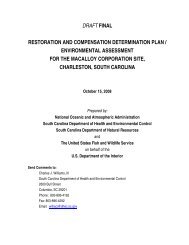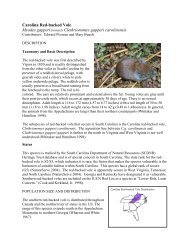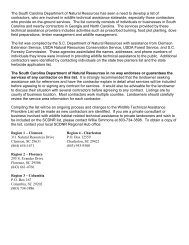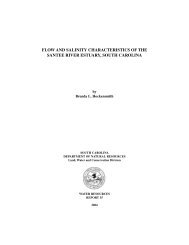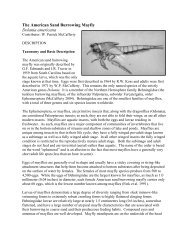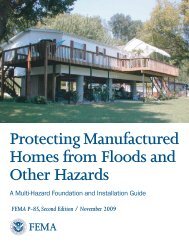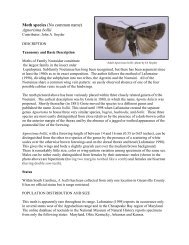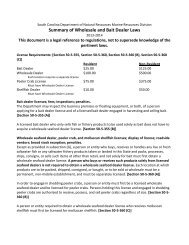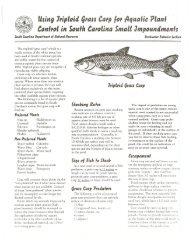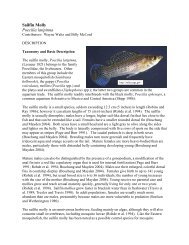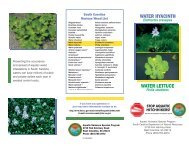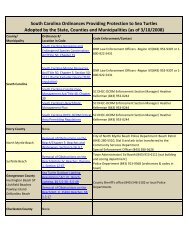Pond Management - South Carolina Department of Natural Resources
Pond Management - South Carolina Department of Natural Resources
Pond Management - South Carolina Department of Natural Resources
You also want an ePaper? Increase the reach of your titles
YUMPU automatically turns print PDFs into web optimized ePapers that Google loves.
Herbicides<br />
Aquatic herbicides are a widely used method <strong>of</strong> vegetation control<br />
in ponds. Properly applied, they can safely and efficiently combat<br />
a number <strong>of</strong> nuisance plant species. Accurate identification <strong>of</strong><br />
the target plant is an absolute must prior to treatment as many<br />
herbicides are very selective in their action and level <strong>of</strong> control<br />
on a particular weed species. Always obtain pr<strong>of</strong>essional advice<br />
on the plant’s identification and recommendations for the<br />
appropriate herbicide treatment. This assistance is available,<br />
free <strong>of</strong> charge, from several state and federal agencies including<br />
the regional <strong>of</strong>fices <strong>of</strong> the SCDNR. It is neither economical nor<br />
environmentally responsible to use a herbicide that is not effective.<br />
Use only herbicides that are federally-approved and labeled for<br />
aquatic weed control. Always Read the Entire Label<br />
Before You Use Any Herbicide and Follow Label<br />
Directions Carefully. Misuse or the use <strong>of</strong> unapproved<br />
herbicides could be dangerous to fish, mammals, turtles, birds,<br />
bankside vegetation, etc. They could cause downstream damage<br />
for which you could be held liable. If you have any doubt about the<br />
meaning <strong>of</strong> the label directions, contact an expert – don’t guess.<br />
Biological Control<br />
Several species <strong>of</strong> fish have been successfully used to control<br />
weeds in recreational fishing ponds. These include tilapia (African<br />
bream) and triploid grass carp (white amur). Be aware that other<br />
species <strong>of</strong> fishes may also consume vegetation, but for the most<br />
part have been shown to be marginally effective or may be illegal<br />
to import or possess in this state. If you have any doubts about a<br />
particular species <strong>of</strong> fish, contact the SCDNR for clarification prior<br />
to obtaining them. Tilapia are tropical fish that are advertised by<br />
their producers to consume a wide variety <strong>of</strong> aquatic vegetation.<br />
Unfortunately, they are usually less effective than advertised,<br />
but will control some species <strong>of</strong> filamentous algae when stocked<br />
in the spring at rates from 250-400 fish per acre. Winter water<br />
temperatures are fatal to these fish so annual restocking is required.<br />
Triploid grass carp are a sterile form <strong>of</strong> the original white amur.<br />
They <strong>of</strong>ten produce better long-term results for the money than<br />
herbicide treatments. Although grass carp will control a wide<br />
variety <strong>of</strong> submersed vegetation, they should not be considered a<br />
20



